- Home
- Steve Erickson
Days Between Stations Page 16
Days Between Stations Read online
Page 16
Fletcher pivoted away from the old man. He sat on the bed next to him but didn’t seem aware any longer that Adolphe was there. He placed his face in his hands. “So I,” he finally said, “continue looking, I suppose.” Adolphe was lost in a memory.
Fletcher was lost in despair. Now he was unsure, for the first time, that Adolphe had even filmed an ending, though Adolphe claimed to. He distrusted everything Adolphe remembered or did not remember. The film in the can had nothing to do with Marat. He rewound the film and put it back in the metal box and put the box in the trunk.
And yet, and yet. There was that picture on the wall of Thierry Touraine in the bathtub, dagger in his heart. And there was simply no real way to make the film a coherent whole without the murder; the entire film was structured, both narratively and stylistically, to lead up to the scene where the girl killed the revolutionary. Without that scene the two characters in the film remained isolated forever, paths never crossing; to show the film to the public without the murder would be to leave it forever unfinished. Fletcher simply wasn’t ready to do that yet: not after coming this far, he told himself.
So Fletcher continued looking, and the search, despite the publicity, became more difficult, not less. If all the speeches and magazines and newspapers had ignited interest in the subject of Adolphe and Marat, those same forums became impatient and snide when the mystery appeared to be without solution. Now almost everyone seriously questioned that there was an ending to the film; and, as had happened decades before, the worth of the film became suspect, the film and its art were as good as nonexistent if they remained unrevealed to the world.
Days passed. Responses came floating back to Fletcher from unseen places outside seventeen rue de Sacrifice: dark phone calls in the middle of the night, and letters that always led to nothing. Adolphe was a prisoner of and resistant factor in the film’s destiny. Another autumn came and then the second of two embalming winters; and one day the telephone rang. It was a man asking about an ad he had seen in Le Figaro, which had run so long now Fletcher had forgotten it but for the moments he had considered and then declined to cancel it. But this call, Fletcher realized immediately, was different, because the man on the other end was describing the scene of Marat’s murder in some detail, down to the crossed flintlocks above the bath. “What kind of condition is the film in?” Fletcher asked.
“It seems to be in good condition,” said the other man.
“I’d be interested in seeing it.”
“Well, would you want me to come there?”
“No. I’ll come to you.”
“All right. The electricity is off more than on in the hotel where I’m staying.”
“It’s been like that in Paris for a while now.”
“Yes, in the States too.”
Fletcher said, “If it is the film, what’s your price for it?”
“I’m not selling it,” came the answer. The voice on the other end waited for Fletcher to respond, and when he didn’t, went on: “I think there’s been a mix-up.”
“What do you mean?” Fletcher said.
There was more silence. “Well,” he said, “if this is the film you’re looking for, and if I’m right, then you ought to know what I mean. I mean there’s been a switch. If I have your film, then you have my film.”
Fletcher said nothing.
“Maybe this is a mistake,” said the voice.
“No,” Fletcher said quickly. Then, “Tell me about the film you’re looking for.”
“It’s been some time since I saw it. Several years. There’s a woman in a house.” Still another pause. “Maybe this is a mistake,” he said again.
“I don’t understand how this switch took place,” Fletcher said.
“I don’t either.”
“You must have some idea.”
“Why should I, if you don’t?”
“I’m representing another party.”
The other voice finally said, “I don’t know how the switch was made. I don’t remember. But I’d like the film back.”
“But perhaps it isn’t your film,” Fletcher started.
The man said, “It is. Obviously, obviously you have it.”
“Can we discuss this in person?”
“That’s fine, but the trade is the deal. I’m not negotiating. I won’t sell it. If you want to meet, I’ll see you underground at the Métro at Saint-Germain-des-Prés. You’ll have to bring the other film with you. Is three o’clock all right?”
At two-thirty Fletcher Grahame left seventeen rue de Sacrifice. It was a long way to Saint-Germain-des-Prés; though some of the underground stations and pedestrian passages were open, the trains themselves hadn’t run in over a year. Fletcher walked down the boulevard Saint-Michel hoping to flag a taxi, with no luck. Then he walked up the boulevard Saint-Germain. The streets were filled with smoke from all the fires. Some people wore handkerchiefs to keep soot out of their mouths and noses. It was magnificently cold, like Montreal, and everything was slick, so the walk was that much slower. When Fletcher got to the main entrance of the Métro at Saint-Germain-des-Prés, a huge bonfire was roaring there, with a crowd of people gathered around; there was no getting through the gateway. Fletcher crossed the street to the other entrance, and gingerly made his way down. Underground, he stood waiting in the designated place for his rendezvous.
Five minutes later, he saw him approaching from the far end of the tunnel. He had black hair and wore a long, old blue coat, and there was a film can under his arm. He looked younger than Fletcher had expected, but what was startling was how much he looked like old photographs of Adolphe Sarre. When he walked up, there was no exchange of names, only a perfunctory handshake, and a nod of recognition. “The hotel’s electricity seems to be on in the afternoon,” explained the other man.
They went to the hotel and walked up the two, three, four levels. The room was very cold but there was a small heater which would go fifteen or twenty minutes for a franc when the electricity was on. Indeed, there now seemed to be power. Once again, though, Fletcher protested. “I don’t see,” he said, “that I should have to bargain with you to get returned what is mine.”
“You’re only returning to me what’s mine,” said the other man.
“I don’t know that it’s yours.”
“No more or less certainly than I know this picture”—he tapped the reel in the projector—“is yours.”
Fletcher gazed at him sullenly. “Let’s see what you have,” he finally said. The other man began the film; and within the first several seconds, Fletcher’s heart stopped. Faded as the images were in the afternoon light, they were nonetheless what he’d always imagined they would be, and that was what so astounded him—the lack of surprise, the manifestation of his own imagination; and he had a difficult time believing it was real, the woman on Adolphe’s wall coming into Marat’s private bath, and in ecstatic frenzy killing him. His body lurched at the knife, and every detail was vivid: the steam rising from the bath, the way the muscles in her legs tensed when she committed the act, the splash of water from the tub, the passion with which she backed away from the blood. The stills in Adolphe’s room had come into motion like the paintings of Franklin Grahame’s study taking on life, with a resounding clarity. Fletcher realized he had been reconciling himself to the idea that the film, like his father’s “genius,” was a hoax of some sort after all. But now it did exist, before him, and with it a new certainty: there were the guns above the bath, and no one in the scene was aware of them at all, or supposed that at least one of them was loaded and ready to fire, and that thirty years later someone would hear that report for the first time, and that sixty years later he would still be hearing it. The film ran out and Fletcher just watched the wall. He finally looked up at the other man, who was winding the film back and packing it in its can. Neither of them said anything.
When he finished, the man said, “I’d like to see the other picture,” and he pointed at the film in Fletcher’s lap. Fletcher stared a
t him.
He didn’t understand why he was so reluctant to hand over the other film. Somehow he didn’t seem to feel he should have to give anything for what he’d just seen; he had already given enough and he was entitled to it. Moreover, for some reason giving something to this man in particular was worst of all. But he held out the film, and watched as it ran through the projector; and it had been on the wall of the room less than a minute before it was shut off. “What’s wrong?” Fletcher said, now suddenly alarmed.
The other man just leaned against the wall next to two shuttered doors that led to a balcony. He stared at the floor, breathing deeply.
“What is it?” Fletcher said again. “Are you all right?”
“Yes.”
“You look like you’re sick.”
“No.”
“Is it the film you were looking for?”
The other man nodded. Fletcher licked his lips, and waited. Finally the man raised his head and looked back at the wall, and then at Fletcher. “Well, then it’s settled.”
“Yes.”
“The two women in our pictures, they look very similar.” He handed Fletcher the film.
“Like mother and daughter,” Fletcher agreed.
“Do you think so?” the other man said.
“It’s not likely.”
“No. I suppose it’s not.”
Fletcher licked his lips and said, “Well.” He tapped the film under his arm. “Then it’s settled.” He licked his lips again and nodded again, resentfully. He pulled his coat closer to him. “Don’t understand how the two got mixed up but it’s straightened out now.”
“Yes it is,” said the other one, waiting for him to leave.
And Fletcher Grahame left, somewhat quickly.
When he awoke, in the middle of the night, he believed she was there. Ever since seeing the film, Adolphe was racked with the memory he couldn’t locate; he felt himself lost in a remembrance warp. Over and over he scanned his past, for that day or week or month when he found her again, walking the halls of that old house. He sat up in bed and shook his head. Why had he blocked it out? he kept asking himself. Why had he allowed himself to go on thinking the last time he saw her was that day in the Tuileries Gardens, when there she was, on his celluloid, years later, lonely and sad? If she had allowed him to film her that way, she must have forgiven him, he decided. Or perhaps she simply no longer remembered him at all.
He wished he had understood what she was saying in the film. In the muted, ever-present light of this room, he didn’t remember anything. I’m so damned old, he told himself.
And then he wondered the obvious; he approached, not too cautiously, the inescapable—that she was in fact still there, behind the screen. That she had, of course, never left, but was there behind the walls now. Janine, he said, and he looked around him. Somehow she had gotten back there, she had done what he could not do: rush through the first opportune door into the light on the other side. It occurred to him that to have taken such a chance, and to have found such courage, she must have felt very defeated and betrayed, and without much reason to be alive. To have gone over there like that, not knowing what it would be like, she would have had to come to the conclusion that nothing could be worse than this, that nothing could make her feel more desolate or unhappy. And he knew he had done that to her, he had made her that way; he knew he was no human being—just a projection, another shadow of somebody else’s form. He remembered lying on the battlefields of war amused and fascinated by the lights in the sky while men agonized and expired around him; and he realized that growing up as a child in this very room, where he had now retired to die (he looked around him; he ran his fingernails along the wall and pressed his lips close to it. Janine, he whispered), was perfect in its perversion, in the twisted wholeness with which the fact surrounded him. He realized he was meant to be abandoned from the first; and from the first he had abandoned the world he lived in. He wished to be abandoned now by life.
He got up and opened the chest before him. He took out the film. He wanted to look at her again, to watch her move. He wanted to try and understand the words. He didn’t care if she was old, he didn’t care if her dirty yellow hair was gray. He didn’t care if her sad mouth had grown small, and her sad face had grown small; he thought it was possible he could project the film on the wall and, in the glare of light when the film ran out, get through. He fumbled with the projector and film; but then he got it started, and he watched.
Before him, he saw not an older woman in a house but a young girl raising her knife in the air, and the close-up of her eyes those last days in Wyndeaux when he made love to her. Astonished, he went to the chest again.
“What are you doing?”
Adolphe whirled around. The sound of the projector clicked and fluttered; he hadn’t heard the other man approach.
“What are you doing?” Fletcher said in the doorway.
“Where is it?” said Adolphe.
“Where is what?”
“Janine in the house.”
“This is the film,” Fletcher said, indicating the projector.
“This is Marat.”
“That’s right. The picture is now complete. We open at the Opéra in three months. It doesn’t give us a lot of time. We’re moving tomorrow.”
“Moving?”
“To a larger studio. We have a lot of work ahead of us, getting the film into shape. I’ll be hiring a staff.”
Adolphe shook his head. “What are you talking about?” He looked dazed.
“Go back to bed,” Fletcher said.
“Wait a minute,” said the old man. He grabbed Fletcher by the shoulder. “Where’s the other film?”
Fletcher stared at him, expressionless. “What other film?” he said flatly.
“Janine, as an older woman. You know.” He motioned with his hands. “In the house…we—”
“There is no other film.”
“But there is. You remember.”
“No.”
“Janine—”
“That was not Janine.”
Adolphe looked up at Fletcher. “What do you mean?” he said.
“That was your daughter,” Fletcher said. “Janine is gone, remember?”
“But—”
“Go to bed, Adolphe,” Fletcher said. “Marat is finished. We play the Opéra in March.” He added, just to make sure it was understood, “This is your big moment.”
Adolphe sat in his chair, the one he liked, long after Fletcher had left, staring at the light of the projector, not hearing its whir. Occasionally he would lean back in his chair and press his ear to the wall, listening.
Twice, he mistook the lights. Because he was so old—somewhere past eighty, he never knew exactly—it wasn’t unreasonable to assume that perhaps his eyes were going, that he was seeing things. But even at this point in life his eyes were still good, remarkable in fact. A scan across the Paris facades from his houseboat on the Seine revealed nearly everything to him. And drifting into Paris that October, when it was already becoming bitterly cold, he only assumed that what he saw were more fires in the windows along the river. Fires on the street corners, fires on the bridges, fires in the buildings themselves: Parisians setting their furniture on fire, diaries and family portraits, stale food, up in smoke. Drifting into Paris on the Seine that October, one small inferno after another passed him by, while great hunks of ice scraped the hull of the old houseboat, the vessel resoundingly rocked by every collision.
The first mistake was a light on the rock beneath Pont-Neuf; he thought at the time it was an odd place for a fire. As the boat approached the rock he realized it wasn’t a fire at all, but rather a glowing fragment of ice perched precariously in its place and poised for the taking. He took it, leaning dangerously over the edge of the boat and, rather nimbly for a man of his age, snatching it up as it glided within reach. Mystified, he put the glowing ice in the cabin of his boat some distance from the stove, wondering if it would melt down to its source of ligh
t, or if the light would simply melt with it. He sat in the cabin staring at the ice until he became drowsy, and then fell asleep; he woke with a start, with the horrified expectation that he would find nothing but a pool of glistening water where the ice had been set. Rather, he found an old cognac bottle, with a long curved neck. In the flickering light of the lantern, he held the bottle close to his face, and there blinked up at him, from within the bottle, two blue eyes.
The old man looked at the eyes, then looked up from the bottle. That night he lay staring at the ceiling of the cabin, baffled—and it was not until he woke, at three in the morning, and glanced over quickly at the bottle again, that there unlodged from the gravity of his deep-gone past a memory. Not all of it he could catch. He got up again, held the bottle before him again, and remembered the eyes again: was it Crete? Or Naples. Or the coast of Morocco. Or the beach off San Sebastian?
The Seine froze overnight; he woke to find the boat wedged fast in the middle of the river. He realized he was going to be here awhile. In the mornings he would rise and walk across the ice to the quays, up the steps to the boulevards along the Seine, to the boulangeries to buy bread. At night he would listen to the sound of the ice against the boat’s body, pressing its wooden fiber. He missed the way the boat usually rocked, and found it hard to sleep.
The second mistake was another light on the river. He saw it first from far away, one evening as the dark flaming red of the sun crossed the black sky. This light on the river moved like a torch, from far past the cathedral and bookstands, gliding over the boulevard Saint-Michel, then to the island. The torch seemed to flicker wildly as a gust came up from the frozen river. He continued watching the light for a quarter of an hour until it reached the Pont-Neuf, very close to where he’d found the bottle, until it was so close that, like the bottle, he saw it wasn’t a flame at all but rather her yellow hair.
Slowly he walked across the river, its silver gleam rising around him. She came down the steps. When he asked why she was walking in the cold, and when he told her he’d thought she was another bonfire, loose and tumbling along the riverbanks, she said something back in a halting and broken French. He spoke a halting and broken English. He asked if she’d like something hot to drink; and she, happy to make an acquaintance, accepted the invitation. She explained she had a rendezvous to keep in an hour there at the Pont-Neuf.

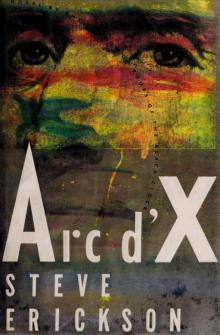 ARC D’X
ARC D’X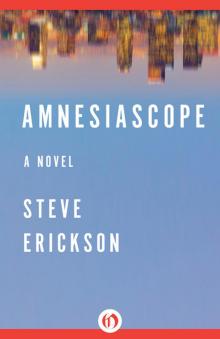 Amnesiascope
Amnesiascope Our Ecstatic Days
Our Ecstatic Days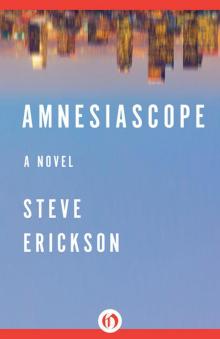 Amnesiascope: A Novel
Amnesiascope: A Novel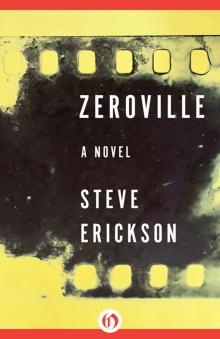 Zeroville
Zeroville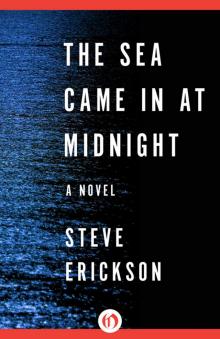 The Sea Came in at Midnight
The Sea Came in at Midnight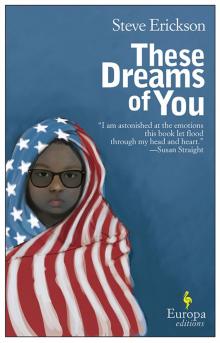 These Dreams of You
These Dreams of You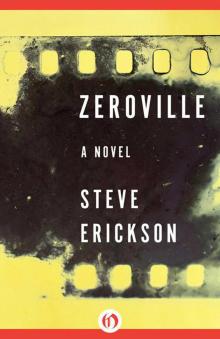 Zeroville: A Novel
Zeroville: A Novel Days Between Stations
Days Between Stations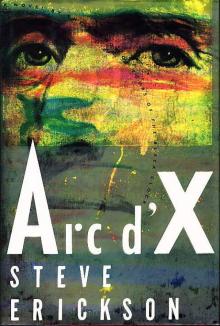 (1993) Arc d'X
(1993) Arc d'X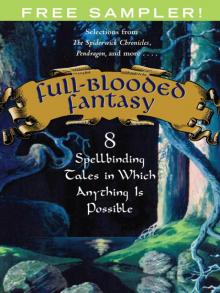 Full-Blooded Fantasy
Full-Blooded Fantasy